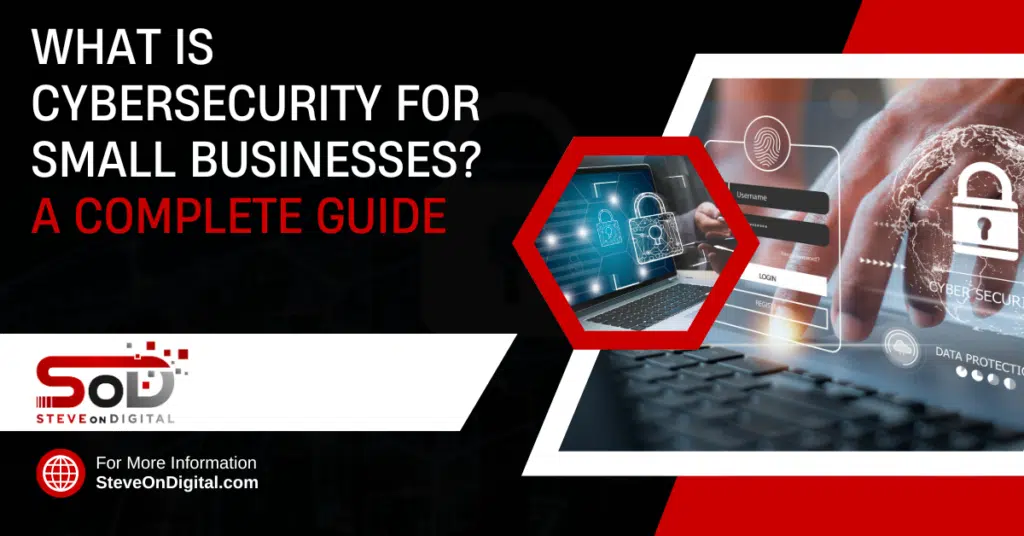What Is Cybersecurity For Small Businesses? – A Complete Guide

As a small business owner myself and the driving force behind SteveOnDigital, I’ve witnessed firsthand the escalating landscape of cyber threats that challenge small enterprises every day. It’s not just the large corporations that are at risk; small and medium businesses are increasingly becoming targets for cybercriminals. My experience has shown me that understanding and implementing effective cybersecurity measures is not just beneficial—it’s essential for the survival and growth of a small business. Cybersecurity for small businesses isn’t merely a precaution; it’s a vital component of business operation in today’s digital world. Recent data reveals that small businesses are the target of 43% of cyber attacks, and yet, only 14% of small businesses are prepared to defend themselves (Source: Cybint Solutions). These statistics highlight a critical gap in cyber defenses that can lead to severe financial and reputational damage. Understanding Cyber Threats To Small Businesses What Are Cyber Threats? Cyber threats, or cyber security risks, encompass any potential malicious attack that seeks to unlawfully access data, disrupt digital operations, or damage information. Small businesses often face threats such as phishing attacks, malware, ransomware, and data breaches. Each of these can be catastrophic, disrupting business operations and compromising sensitive information. Common Cyber Threats: Threat Type Description Typical Impact on Small Businesses Phishing Attacks Fraudulent attempts to obtain sensitive information. Can lead to data breaches and financial loss. Malware Malicious software aimed at damaging or disabling computers. Disrupts operations, risks data integrity. Ransomware Malware that locks data, demanding payment for access. Financial losses and potential loss of critical data. Data Breaches Unauthorized access to company data. Loss of customer trust, potential legal consequences. Impact On Business Operations And Reputation: The effect of cyber attacks on small businesses can be devastating. Financially, the average cost of a cyber attack on a small business is around $200,000—a staggering sum that can jeopardize the future of a business (Source: CNBC). Beyond the financial impact, the reputational damage can be even more challenging to repair. Loss of customer trust and negative media coverage can persist long after the incident is resolved. Establishing Strong Security Policies In the world of small business, having strong security policies is not just a recommendation; it’s a necessity. As the owner of SteveOnDigital, I can’t stress enough how vital these policies are. They serve as the foundation for protecting your business’s digital assets and sensitive information. Clear and robust security policies ensure that everyone in the company understands their role in safeguarding the business. Importance Of Having Clear Security Policies Key Elements Of Effective Security Policies For Small Businesses Training Employees On Cybersecurity Best Practices One of the most significant vulnerabilities in any security system is the human element. That’s why training employees on cybersecurity best practices is so crucial. At SteveOnDigital, I’ve seen the benefits of well-informed employees who can spot and prevent potential threats before they escalate. Role Of Employee Awareness In Preventing Cyber Attacks Types Of Training Programs: From Phishing Awareness To Password Management Implementing Robust Security Measures In my years as a digital transformation specialist and the head of SteveOnDigital, I’ve advised numerous small businesses on the best ways to fortify their cyber defenses. An essential part of this process involves implementing robust security measures. Every small business, regardless of size or industry, needs to defend itself against increasingly sophisticated cyber threats. Overview Of Essential Security Measures Special Focus On Multi-Factor Authentication And Its Benefits Multi-factor authentication (MFA) has become a cornerstone of modern cybersecurity practices, and for good reason. MFA adds an additional layer of security by requiring users to provide two or more verification factors to gain access to a resource such as a system, application, or online service. Protecting Sensitive Data As small businesses increasingly rely on digital tools and online services, protecting sensitive data becomes more critical. This data includes everything from customer information and employee records to financial data and intellectual property. Types Of Sensitive Data Commonly Held By Small Businesses Strategies For Data Encryption And Secure Data Storage Encrypting sensitive data is one of the most effective ways to protect it from unauthorized access. Encryption converts the original data into an encoded version that can only be decoded with a decryption key. Managing User Accounts And Access Controls In my journey as the founder of SteveOnDigital, I’ve seen firsthand how the management of user accounts and access controls can make or break the cybersecurity posture of a small business. It’s crucial to implement stringent controls that ensure only the right people have the right access at the right times. Importance Of Role-Based Access To Sensitive Information Procedures For Creating And Managing User Accounts Securing The Business Network And Internet Connection As a digital transformation specialist, I emphasize to all small business owners the critical importance of securing their network and internet connections. These are often the gateways through which cyber attackers gain access to business-critical information. Steps To Secure A Business Network Importance Of Secure Wi-Fi Networks And How To Protect Them Regular Risk Assessments And Security Audits In the rapidly evolving digital landscape, regular risk assessments and security audits are crucial for maintaining robust cybersecurity, especially for small businesses. Having spent years guiding small and medium businesses through digital transformations, I’ve seen the positive impact that proactive security measures can have on preventing cyber incidents. How To Conduct A Cyber Risk Assessment The Role Of Regular Audits In Maintaining Cybersecurity Developing An Incident Response Plan An effective incident response plan is your business’s playbook for dealing with potential cyber security incidents.As someone who has both developed and activated these plans, I can attest to their value in minimizing damage during an incident. Components Of An Effective Incident Response Plan Component Description Purpose Preparation Tools and procedures for handling an incident. Ensures readiness to respond to cyber incidents. Identification Detection of potential security incidents. Early detection to limit damage. Containment Short and long-term containment strategies. Prevents spread of the incident within the network. Eradication Removal of the security threat. Cleans
How To Create A Small Business Cybersecurity Plan – SOD

In the fast-paced digital era, small businesses face increasing threats that can compromise their operations, customer trust, and even their existence. Cybersecurity isn’t just a concern for large corporations; it’s equally crucial for small businesses. These enterprises often hold sensitive data but lack the robust security measures of larger firms, making them attractive targets for cybercriminals. The Growing Threat Landscape The digital landscape is rife with hazards such as cyber attacks and data breaches, which have escalated in both frequency and sophistication. For small businesses, the repercussions of these threats are severe, as they can disrupt business operations and lead to significant financial losses. With limited resources to recover, small businesses must prioritize cybersecurity to protect their assets and maintain customer trust. Threat Type Description Potential Impact Phishing Attacks Fraudulent attempts to obtain sensitive information. Unauthorized access to business and customer data. Ransomware Malicious software that locks access to user data. Financial losses and operational disruption. Data Breaches Unauthorized access to sensitive data. Financial loss, reputational damage, legal penalties. The Cost Of A Cyber Attack The impact of a cyber attack extends beyond immediate financial losses. The reputational damage from a data breach can deter customers, potentially crippling future revenue. According to a report by Verizon, 43% of cyber attacks target small businesses, and the average cost of a data breach for small to medium-sized businesses can exceed $2.5 million. This makes it imperative for small businesses to fortify their defenses against these digital threats. Understanding Your Risks Conducting A Security Risk Assessment A fundamental step in fortifying your business against cyber threats is conducting a security risk assessment. This process helps you identify critical data that could be targeted by cybercriminals and assess the relative risk to your operations. Understanding what specific data needs protection allows you to tailor your cybersecurity plan effectively. Common Threats To Small Businesses Small businesses often face phishing attacks and malware, which are among the most prevalent threats. These attacks can lead to compromised systems and unauthorized access to sensitive data. Training employees to recognize and report phishing attempts is a critical step in mitigating this risk. Mobile Devices: A Growing Security Concern The use of mobile devices in business operations has introduced new security challenges. These devices can be a source of data loss if not adequately secured. Unauthorized access via lost or stolen mobile devices can expose business data and sensitive customer information to cybercriminals. Implementing security measures like strong passwords, encryption, and remote wipe capabilities is essential to safeguard mobile devices used in business operations. Building Your Cybersecurity Strategy As a seasoned digital transformation specialist, I have seen first-hand the devastating impact a lack of cybersecurity can have on small businesses. From data breaches that expose customer information to cyber attacks that cripple daily operations, the risks are real and can be catastrophic. That’s why it’s critical for every small business to develop a robust cybersecurity strategy. Here, I’ll guide you through setting up fundamental security practices, securing your network, and protecting your most valuable assets. Implementing Basic Security Practices The foundation of any cybersecurity plan involves basic security practices that are easy to implement but significantly enhance your security posture. Implementing these practices doesn’t just safeguard your business; it also sets a standard for your team, emphasizing the importance of cybersecurity in daily operations. Network Security: Securing Your Digital Perimeter Network security is crucial as it protects the usability and integrity of your network and data. It includes both hardware and software technologies. These measures help create a secure boundary around your digital assets, protecting them from unauthorized access and threats. Data Security: Protecting Your Most Valuable Assets Data security focuses on protecting your business’s critical data from unauthorized access, corruption, or theft throughout its lifecycle. By protecting your data, you ensure the privacy and security of your customer information and business intellectual property, which are often the targets of cyber attacks. Essential Security Measures While establishing basic practices and securing both network and data are foundational, enhancing your security with additional measures can further reduce the risk of cyber incidents. These next steps are vital for reinforcing your cybersecurity framework. Multi-Factor Authentication: Adding An Extra Layer Of Protection Multi-factor authentication (MFA) is a security system that requires more than one method of authentication from independent categories of credentials to verify the user’s identity for a login or other transaction. MFA combines two or more independent credentials: what the user knows (password), what the user has (security token), and what the user is (biometric verification). Using MFA can be one of the most effective defenses against cyber attacks, particularly phishing scams and identity theft. Data Loss Prevention Strategies In any cybersecurity plan, preventing data loss is crucial. This involves strategies to protect data from being lost, stolen, or accidentally deleted. These strategies help safeguard your data by controlling how it is accessed and transferred while preparing your business for recovery should data loss occur. Continuous Vulnerability Management Regularly assessing and addressing vulnerabilities in your cybersecurity is essential for maintaining the security integrity of your systems. A continuous vulnerability management strategy ensures that potential security weaknesses are addressed promptly, reducing the window of opportunity for cybercriminals to exploit these vulnerabilities. Empowering Your Employees In my role as a Digital Transformation Specialist, I’ve witnessed firsthand how crucial it is to empower employees with the right knowledge and tools to protect against cyber threats. Here’s how you can create a secure environment through informed and vigilant teams. Creating Security Policies: What Employees Need To Know Developing clear and effective security policies is the cornerstone of a small business’s cybersecurity plan. These policies not only set expectations but also provide a baseline for security practices within your company. Security Awareness Training: Educating Employees On Cyber Threats Continuous education on cyber threats is vital. Regular training sessions can help employees stay updated on the latest cyber threats and learn how to handle them. Phishing Simulations: Testing Employee Preparedness Simulated phishing attacks are practical exercises
The Cost Of Cybersecurity For Small Businesses – SteveOnDigital

As Steve Johnston, I’ve seen firsthand how vital cybersecurity is to the fabric of small businesses. In today’s digital age, protecting your business from cyber threats is not just a precaution; it’s a necessity. Recent statistics reveal that a significant portion of small businesses remain highly susceptible to cyberattacks. For instance, nearly half of small businesses experienced a cyberattack last year alone, underscoring the persistent risk these entities face. What Does Cybersecurity Mean For A Small Business? For small businesses, cybersecurity represents the shield that guards against potential financial ruin and loss of customer trust. This protection spans several fronts, from safeguarding sensitive customer data against breaches to ensuring business continuity in the face of security incidents. Cybersecurity isn’t just about installing antivirus software; it’s about creating a resilient environment that can withstand and quickly recover from cybersecurity incidents, emphasizing their significant impact on operations and customer trust. Common Cyber Threats Faced By Small Businesses Small businesses encounter a variety of cyber threats, with malware, phishing, and ransomware being particularly prevalent. In recent years, malware attacks have been targeted, with a notable percentage resulting in the leakage of confidential data. Phishing attacks, often delivered via email, remain a top cybersecurity concern, with a significant portion of data breaches stemming from such incidents. Implications Of Data Breaches And Cyber Attacks The consequences of cyber attacks for small businesses can be severe, impacting everything from operational capability to financial stability. Data breaches can lead to substantial direct costs, including emergency solutions and legal fines, with many incidents costing between $826 and $653,587. Furthermore, about half of small businesses report that recovery from an attack takes 24 hours or longer, significantly disrupting business operations. The True Cost Of Cybersecurity For Small Businesses I’ve guided many small businesses through the digital transformation landscape, and I’ve seen how vital cybersecurity is to their success and sustainability. Cybersecurity spending has become a critical component of a small business’s budget, reflecting the increasing investment necessary to protect against cyber threats and adapt to the evolving digital landscape. Here’s a breakdown of the costs associated with cybersecurity, along with insights into managing these expenses effectively. Outline Of Direct And Indirect Costs Associated With Cybersecurity Cybersecurity involves various direct and indirect costs that can significantly impact a small business’s budget. Type of Cost Examples Estimated Cost Range Direct Costs Legal fees, Recovery solutions $1,000 – $100,000 Indirect Costs Downtime, Lost revenue, Reputation damage $2,000 – $500,000 Common Cybersecurity Measures And Their Costs To protect against cyber threats, small businesses typically implement several cybersecurity measures. These measures, while necessary, come with their own set of costs: Cybersecurity Measure Average Cost (USD) Antivirus Software $30 – $50 per user per year Firewalls $700 – $1,000 (small business setup) Two-Factor Authentication $3 – $6 per user per month Data Encryption $500 – $2,000 (based on data volume and complexity) Cybersecurity Budget Considerations For Small Businesses Crafting a cybersecurity budget requires careful consideration. It’s not just about the cheapest options; it’s about effective, scalable solutions that offer real protection. How Cyber Attacks Impact Small Business Growth Cybersecurity is not just a technical necessity; it’s a business imperative. Here’s how cyber threats can affect your business growth and operations. Link Between Cybersecurity And Business Growth Effective cybersecurity strategies are crucial for ensuring business continuity and growth. A robust cybersecurity posture not only protects against data breaches but also safeguards the business’s reputation, ensuring customer trust and loyalty, which are essential for business growth. How Cyber Threats Hinder Business Operations And Growth Cyber incidents can disrupt business operations, leading to downtime, lost revenue, and potentially catastrophic financial strains. For example, a ransomware attack can lock a business out of its systems, halting operations completely until a ransom is paid or systems are restored. Real-Life Examples Of Businesses Impacted By Cyber Incidents Many small businesses have suffered devastating consequences due to cyber incidents. For instance, a small retail business may experience a data breach resulting in significant customer data loss. The recovery costs, coupled with fines and lost customer trust, can stifle growth for years. Analyzing Small Business Preparedness: Statistics And Trends In my experience as Steve Johnston, guiding small businesses through digital challenges, I’ve observed varying levels of cybersecurity preparedness, often hindered by fewer security protections compared to larger enterprises. This disparity in cybersecurity defenses makes smaller businesses more attractive targets for cybercriminals. Here’s what recent statistics say about how well small businesses are prepared against cyber threats. Current State Of Small Business Cybersecurity Preparedness Recent data reveals a concerning trend: a significant number of small businesses lack robust cybersecurity defenses. A study found that only about 14% of small businesses rate their ability to mitigate cyber risks, vulnerabilities, and attacks as highly effective. This is alarming, considering that small businesses are frequent targets of cyber attacks due to perceived lesser security measures. Comparison Between Small And Midsize Businesses When comparing cybersecurity preparedness, small businesses often lag behind their midsize counterparts. Midsize businesses, possibly due to higher resources and greater awareness, tend to implement more comprehensive cybersecurity measures. For example, midsize businesses are more likely to have formal cybersecurity policies in place, such as incident response plans and regular security audits, which are found in only a small percentage of small businesses. Role Of Cybersecurity In Building Resilience Against New Threats For small businesses, investing in cybersecurity is not just about protection; it’s about resilience. The digital landscape is constantly evolving, with new threats emerging regularly. Effective cybersecurity measures enable businesses to withstand and quickly recover from these threats, thereby ensuring business continuity and safeguarding sensitive data. Essential Cybersecurity Measures Every Small Business Should Implement Small business owners must recognize their critical role in safeguarding their operations against cyber threats, emphasizing the need for proactive measures to protect their businesses. To protect against cyber threats, small businesses must implement essential security measures. Here are some crucial steps: Key Security Measures Benefits Of Comprehensive Cybersecurity Measures Implementing these measures can significantly reduce the risk of

